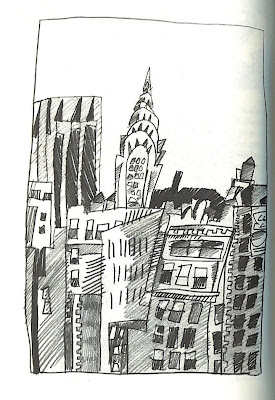 This new edition of Keith Haring's Journals marks the 20th anniversary of Haring's death. After a few years working in publishing, the cynic in me imagines some editor looking through the backlist catalog and saying, hey, next year we can publish a fancy new edition of this book and call it a 20th anniversary edition and sell a lot more copies! Of course, the upside is the renewed attention to Haring's work that this brings about.
This new edition of Keith Haring's Journals marks the 20th anniversary of Haring's death. After a few years working in publishing, the cynic in me imagines some editor looking through the backlist catalog and saying, hey, next year we can publish a fancy new edition of this book and call it a 20th anniversary edition and sell a lot more copies! Of course, the upside is the renewed attention to Haring's work that this brings about.Anyway, it really is a beautiful package--the drawings on the front are debossed (that is, indented into the paper), which creates a lovely tactile sensation. As for the contents of the book, the journals span from 1977 to Haring's death in 1990. But they skip about quite a bit until 1986, when Haring began writing more regularly (1983 and 1984 only take up two entries and there are none for 1985). As a result, the bulk of the book covers the years when Haring was already famous. There's not much of a gradual rise to prominence--suddenly it's just there. I would have liked to read a little more about his early years in New York, before he was running around the world creating high profile murals and museum shows; at the same time, his voice does not change from beginning to end. His opinions and feelings seem unaffected by it all. Much of the entries read like a tedious cataloging of his shows as he travels the globe to create art, but are made interesting by his observations of people, politics, and art.
 Here's one of the French flaps. You can see the indentations from the debossing all the way to the right.
Here's one of the French flaps. You can see the indentations from the debossing all the way to the right. One of Haring's early drawings from the late 70s. I really like this one, even though it's not indicative of his more well known style.
One of Haring's early drawings from the late 70s. I really like this one, even though it's not indicative of his more well known style. I love this picture, how he's literally painted himself into a corner.
I love this picture, how he's literally painted himself into a corner. An illustration from 1984, in Haring's classic style.
An illustration from 1984, in Haring's classic style. His illness is hardly mentioned at all in his journals. It is first brought up offhandedly when a dentist accosts him for not mentioning it before he begins to work on his mouth, and then again in September 1989 (five months before he died) when he says "In light of the new information I received last week about my health, I know I owe it to myself to think for myself for a change." That is about the most in-depth he goes in expressing any worries about his illness and mortality (though I imagine he must have had much more serious thoughts about this--just not on the page). He died incredibly young, and yet he had such a prolific career, despite its brevity. And yet, one has to wonder what might have been had he lived.
His illness is hardly mentioned at all in his journals. It is first brought up offhandedly when a dentist accosts him for not mentioning it before he begins to work on his mouth, and then again in September 1989 (five months before he died) when he says "In light of the new information I received last week about my health, I know I owe it to myself to think for myself for a change." That is about the most in-depth he goes in expressing any worries about his illness and mortality (though I imagine he must have had much more serious thoughts about this--just not on the page). He died incredibly young, and yet he had such a prolific career, despite its brevity. And yet, one has to wonder what might have been had he lived.

No comments:
Post a Comment